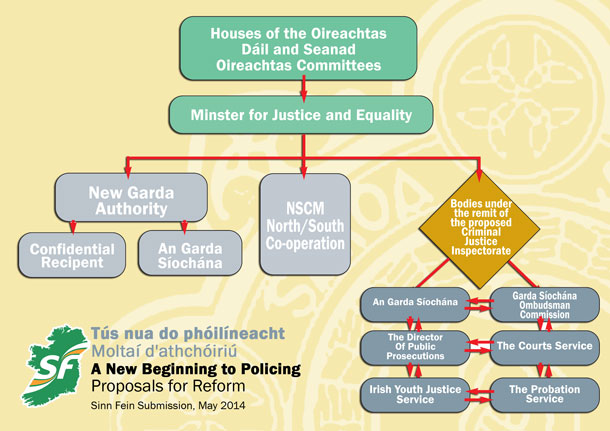2 June 2014 Edition
A case for genuine police reform
After a string of Garda scandals and the Justice Minister is forced to resign, Sinn Féin publishes proposals

• The Commissioner was dismissive, condescending and even insulting to anyone who criticised or questioned the police force
An Taoiseach Enda Kenny expressed his ‘full confidence’ in the Garda Commissioner just two weeks before he unceremoniously retired
THE RESIGNATION of Justice Minister Alan Shatter after two years of scandal within his Department is welcome but unless there is fundamental and radical reform within the Department of Justice this is the political equivalent of replacing the captain on the Titanic after it hit the iceberg and had already started sinking.
It was 4 April 2012 when Garda Sergeant Maurice McCabe went public with his claims that vast amounts of penalty points were being cancelled behind the scenes by gardaí. In many cases it was alleged this was done as a ‘favour’ for friends. Since then, Minister Alan Shatter had been under severe pressure. Throughout this period he was steadfast in his defence of An Garda Síochána and dismissive, condescending and even insulting to anyone who criticised or questioned the police force.
In May 2013, then Justice Minister Shatter went so far as to use an appearance on RTÉ TV’s Prime Time to reveal that gardaí had used discretion not to give Independent TD Michael Wallace penalty points after he was stopped for using his phone while driving. The move was a clear attempt to publicly discredit the TD who had been one of the most vocal in shining the spotlight on malpractice within the force. (The Data Protection Commissioner would eventually report that the Justice Minister had broken the law by revealing this private information about the TD.)
Garda Commissioner Martin Callinan also showed his contempt for the state’s elected officials when he came before the Public Accounts Committee in January of this year. The Commissioner described the actions of the Garda whistleblowers in exposing widespread malpractice within the force as “disgusting” and was visibly annoyed and irritated at the idea of being quizzed by elected members of parliament. Despite his remarks causing widespread outrage, An Taoiseach Enda Kenny expressed his “full confidence” in Callinan just two weeks before the Commissioner unceremoniously retired.
One of the most telling issues of the ‘ShatterGate’ scandal was how, for two years, Eamon Gilmore’s Labour Party stuck to their guns in their rabid defence of the Minister for Justice.
Just over a month before Alan Shatter resigned ahead of the publication of the Guerin Report (which examined allegations that An Garda Síochána under his stewardship failed to properly deal with several cases involving abduction, assault and murder), Fine Gael and Labour Party TDs rallied to his defence and defeated an Opposition ‘no confidence’ motion on the floor of the Dáil supported by Sinn Féin. The alternative motion proposed and passed by the Government parties “commended the Minister for Justice, Equality and Defence, Deputy Alan Shatter, on the extensive and ongoing programme of modernisation and reform being led by him across all of his areas of ministerial responsibility”!
During the debate, Sinn Féin deputy leader Mary Lou McDonald TD demolished the revisionist stance of the Government parties, who continued to downplay the seriousness of some of the comments and actions of Shatter.
“The minister took a deliberate decision to abuse and attack the Garda whistleblowers,” she said. “He misled the Dáil. He allowed false statements to stand on the record of the House. He did not correct the record until it became politically expedient for him to do so. The minister sought to minimise the concerns that were expressed about the possible surveillance of the Garda Síochána Ombudsman Commission.”

• Fomer Garda Commissioner Martin Callinan and Justice Minister Alan Shatter
The Sinn Féin deputy leader also hit out at Shatter’s pathetic attempts to portray possible surveillance of the Garda Ombudsman Commission as some sort of comedy of errors. With the aid of the ever-compliant Irish Independent and Gardaphile hack Paul Williams, the under-fire Justice Minister claimed some of the surveillance of GSOC offices may have simply been interference from a wifi signal in a nearby coffee shop. This claim was dismissed as “wholly inaccurate” by a security and privacy company that carried out a sweep of the GSOC offices.
“Rather than reforming,” Mary Lou McDonald said in response to claims that he was a progressive reformer, “he was dead-set on protecting the status quo he now claims to be set to overturn.
“He did this deliberately. It is clear from his record that he is not a reforming minister when it comes to the Garda Síochána.”

• Gerry Kelly, Gerry Adams, Lynn Boylan and Pádraig Mac Lochlainn launch Sinn Féin’s proposals for policing reform
Sinn Féin Justice spokesperson Pádraig Mac Lochlainn TD says Minister Shatter’s resignation is only the start of what needs to be done to address the crisis in public confidence in the administration of justice in Ireland.
“We need to see the implementation of a new independent policing authority accountable to an independent policing board, the Oireachtas and to local Joint Policing Committees. And the Garda Síochána Ombudsman Commission need to be given more powers to effectively carry out their important work.”
On 20 May, Sinn Féin launched its A New Beginning to Policing – Proposals for Reform document. It includes support for a new independent Garda Authority, expanded powers and reforms of the Garda Síochána Ombudsman Commission, the establishment of a new Criminal Justice Inspectorate and formal North/South co-operation.
The party also submitted these proposals to the Government’s consultation process on the establishment of an Independent Policing Authority.
Speaking to An Phoblacht at the launch of the document, Pádraig Mac Lochlainn said:
“We were promised a new beginning in the Garda Síochána following the shocking revelations that emerged from the Morris Tribunal [which, among other findings, found gardaí had framed innocent citizens for murder]. Unfortunately, the recent scandals have shown that the reforms that flowed from that didn’t go far enough.
“As recently as February in the Dáil, when challenged by myself, the then Justice Minister Alan Shatter robustly rejected a proposal for an independent policing authority. So we welcome the Government’s conversion to support that. It is vital that we have an independent policing authority.”
Pádraig Mac Lochlainn said advisory groups are also needed, noting allegations of racial profiling and some criticism of the Garda from working-class areas, Traveller communities and young people.
Pádraig also hits out at the failure of An Garda Síochána to fully co-operate with GSOC investigations and he called for the right of the Garda Ombudsman to enter and search police stations, as well as the right of the Ombudsman to arrest individuals who are not gardaí but who are engaged in crime for which a garda is being investigated.
Pádraig says Sinn Féin also proposes that the Ombudsman should be able to attend disciplinary hearings against gardaí accused of serious wrongdoing. He noted the failure of An Garda Síochána to act on GSOC recommendations for disciplinary action to be taken against a senior garda tasked with overseeing the policing operation in Rossport against Shell to Sea protesters. In one incident, at least 20 protesters were seriously injured in an attack by baton-wielding members of the force.
“There were very serious concerns expressed by GSOC but no disciplinary action was taken and no explanation given,” says the Donegal TD. “That has to stop.”

• Enda Kenny expressed full confidence in Shatter and Callinan shortly before they resigned
Pádraig says there is also a serious need for a dedicated all-Ireland body that looks at the area of justice and policing, and he makes proposals for the synchronisation of work.
“Partition has undermined the delivery of policing and justice in Ireland,” he says. “A practical example is that we do not have an all-Ireland register of sex offenders. There’s a real concern that you might have it in one state but it’s undermined by the ability of an offender to move throughout the island – so we need joined-up thinking there.
“Other examples would be penalty points on both sides of the Border. Nobody guilty of road safety offences should be able to get away with it because of which jurisdiction they’re in.”
Pádraig also notes the failure of An Garda Síochána to co-operate with the Police Ombudsman in the North into investigations into atrocities by British agents such as the Dublin and Monaghan bombings, the murder of Sinn Féin Councillor Eddie Fullerton and the thwarted bomb attack on the Widow Scallan’s pub in Dublin in which Martin Doherty was shot dead while saving scores of lives.
“It is just not acceptable,” Pádraig Mac Lochlainn says. “You cannot have one policing and justice system undermining the other on this island. It has to stop.”
Gerry Adams told An Phoblacht he believes there is a need for the Irish Government to seriously take on board Sinn Féin’s proposals and deal with other parties in a constructive manner:
“The fact is this Government does not have the energy, strategic capability or any real commitment to the type of reform that is required across a whole range of sectors of this state. We have to remember that Fine Gael was in power during some of the events Pádraig has outlined. But that doesn’t mean they can’t be moved to bring about reform; of course they can. They’ve now given a commitment and we intend to hold them to that.”





